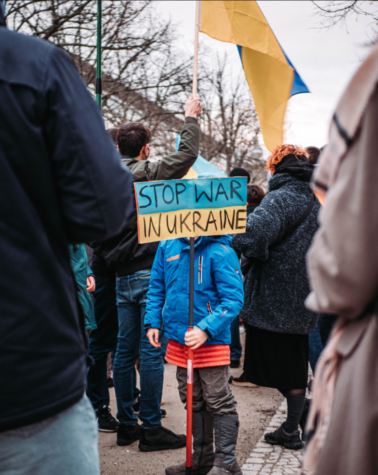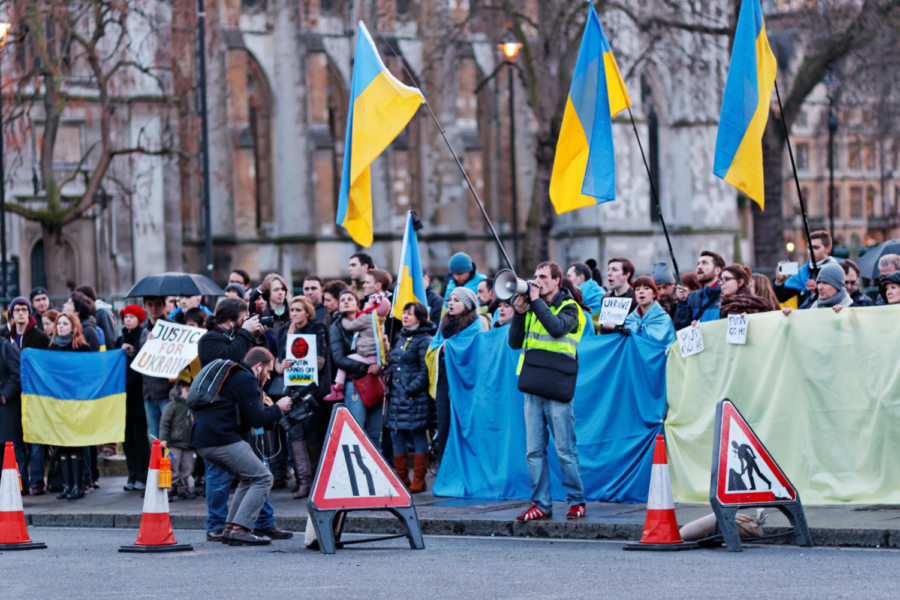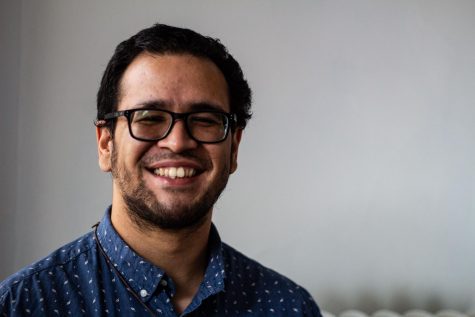NEIU Community Shares Perspectives on Putin’s Regime Invasion to Ukraine
“Remembering the first week of the invasion of the Crimea by Russian forces” by Jordan Busson is marked with CC BY-NC 2.0.
March 12, 2022
Editor’s note: An earlier version of this article had sensitive information related to Ukraine contained in a quote, it has been amended and republished for the safety of those there.
It has been over two weeks since Russia launched an all-out military assault against Ukraine which has been resisting Russian attacks in almost all urban areas and preventing them from achieving air supremacy.
At least 2 million Ukrainians, half of them children, are seeking refuge in neighboring countries to the West.
The Independent spoke to Dr. Martin De Bruyn, Chair of the political sciences department at NEIU and specialist in Europe integration, about his views on this conflict and what could come to the world in the next months.
The Independent also interviewed Olga Shalaeva, a current NEIU international student from Saratov, Russia, and Krystyna Naryzhna, a NEIU CMT alumna from the western Ukrainian town of Kamyanets-Podilsky.
Ukraine needs to keep winning the information war
Although there are growing levels of suffering and destruction in Ukraine, De Bruyn explained some of the positive things that are coming out of the conflict. He said, “Ukrainians control the narrative of the war, in that sense they are winning.”
The images coming out of the eastern European country are harrowing: missiles and artillery barrages shot at residential buildings, mortar fire killing civilians on the streets, tanks flattening private cars and a long list of atrocities committed by the invaders.
The attack hit close to Naryzhna’s family still living in northwestern Ukraine.
“I did not believe that it was true—that the war started—until I received a call from my 80-year-old grandmother,” said Naryzhna. “She was crying and hiding and I could only listen to air raid sirens through the call. At that moment, I [was] simply shocked and only could watch TV emotionless for six days.” Holding back tears, and remembering that she lost connection with her grandmother for six days, Naryzhna added, “I wanted to hug her, protect her, but you cannot do that [across] oceans.”
De Bruyn emphasized the importance of information warfare and said, “public opinion and prestige are important for autocratic regimes like that of Putin.”
Naryzhna, with her eyes looking defiantly at the camera, said, “nobody thought that we would last more than two days and here we are. Ukrainians are brave people.”
Now, more people in the world, and particularly Russians, are understanding that this conflict is not a “special military operation” to “demilitarize and denazify” a brotherly neighbor, like Putin’s propaganda machine has portrayed it. Instead, it looks more like unleashing carnage on a small country by a tyrant daydreaming, in the words of Naryzhna, “about rebuilding not even the Soviet Union but the old Empire.”
But De Bruyn pointed out that the Russian communication strategy is effective at home and with allies. Russians still believe that Putin is not bombarding cities but using “precision bombing” to “denazify” Ukraine.
He said that Putin’s depiction of Ukraine’s government as a dangerous neighbor filled with fascists and drug addicts is the Russian version of George W. Bush administration’s approach of naming Iraq a member of an “axis of evil” and accusing Saddam Hussein of having weapons of mass destruction in order to justify the 2003 invasion.
But while in the United States, Bush’s folly was immediately considered a crime in many political circles and faced strong public opposition, in Putin’s Russia, the situation is different.
Shalaeva said, “If you live in a big city like Moscow you have access to the Internet, so you can figure out things and realize many truths, but rural Russia represents 80 percent of the country’s population. The access to the Internet is poor over there so most people get their news on TV and Putin has control of the message there.”
De Bruyn said Americans are seen by the Kremlin as hypocritical because of their intervention in other countries and weak because of their clumsy Afghanistan withdrawal. He argues that these reasons emboldened the Russian autocrat to invade Ukraine, but his plan backfired.
De Bruyn said that other positive outcomes for the Ukrainians were the revitalization of NATO and the consolidation of European democracies to fight back against Russia’s autocratic influences.

End game: total victory or negotiated settlement.
This fight has been done mostly through economic sanctions and Russians are already feeling their strain.
Shalaeva said she had to scramble to get part of her money into an American bank account she hastily opened before the sanctions took effect. While representing NEIU in the Model of Illinois Government at Springfield, her mom called to tell her that they could not get any money out of Russia. All the Visa and Mastercard connected cards from Russian banks just stopped working.
“I am stuck now, I will have to find a way to stay here legally since I cannot use my money, which Putin is actually using for war. Now, I have to get a full time job and even change my immigration status,” said Shalaeva.
Protests against the war in Ukraine have occurred all over Russia since the conflict started, but Putin’s crackdown has been vigorous. In the past week, the Russian parliament enacted a law that threatens 15 years in jail for anybody who publicly talks about Ukraine’s situation as a war or invasion.
Facebook, Twitter and other social media platforms have been censored in Russia, so people are struggling to organize anti-war demonstrations, and as of March 7, more than 3,000 Russians had been detained for demonstrating against war in Ukraine.
But in general, Russians are not protesting the invasion. Shalaeva said that people who know the truth about the war are scared to protest, and those who do not know “will blame America for everything bad that occurs to them. Even for the broken, unrepaired roads in the middle of the steppes.”
Naryzhna said, “We are not afraid of Putin like Russians are. But I think that in reality Russians do not care. Their media do not even care about dead Russian soldiers.”
For these reasons, De Bruyn thinks there is a minimal possibility that internal turmoil in Russia could produce an end to the Kremlin’s offensive.
Russia’s recent high-level talks with Ukraine in Antalya, Turkey, and the statement from its diplomacy not challenging the statehood of Ukraine could signal that Putin understands his miscalculations and is willing to exit Ukraine with less than what he wanted. Shalaeva said that “the war will only make us [Russian people] poorer.”
Naryzhna is instead hoping for a final Ukrainian military victory and said, “Our news reported on FBI assessments that we are going to win. And I know we are going to win.” She added, “I feel for the sacrifice of so many innocent people, but a lot of Ukrainians feel that this is the moment to definitely stop the Russians after so many centuries of aggressions against us. After the war is over, the world will help rebuild Ukraine and we will prosper.”









